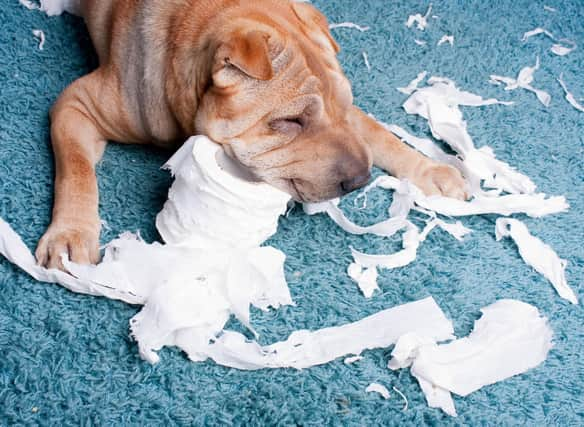Puppy Teething Tips: Expert advice on coping with your adorable dog's dreaded and destructive teething phase
This article contains affiliate links. We may earn a small commission on items purchased through this article, but that does not affect our editorial judgement.


The rise of first-time pet ownership has led to an increased need for expert advice, with PDSA figures revealing that a huge 34 per cent of new owners over the pandemic have declared it is their first experience of owning a pet as an adult.
One common concern of new and less experienced dog owners is how to handle their puppy when it is going through the dreaded teething phase – from antique armchairs to phone charger leads, nothing is safe from your toothy terror during this period.
Advertisement
Hide AdAdvertisement
Hide AdTo give a helping hand on getting through the period Kevin Thackrah, Director of pet-care specialists Petpals, shares his advice on how to keep your puppy’s tail wagging when it’s teething.
When does teething happen?
The exact timeline of when teething occurs can vary depending on the puppy’s breed. In most cases it tends to start at around three weeks of age and lasts for six to eight months in total.
By the time a puppy comes home with you, which is usually around week eight, their baby teeth should have come in - they will have around 28 teeth in total at this point. From week 12 some of your puppy’s baby teeth will begin falling out, so be mindful of tiny teeth appearing around your home.
Home comfort
A great tip for relieving your puppy’s discomfort is to wet a tea towel, twist it, and then freeze it ready for use. The cold from the tea towel helps ease your puppy’s pain, and the chewiness helps encourage correct biting behaviour.
Advertisement
Hide AdAdvertisement
Hide AdAnother great tip is to use fruit and veg such as carrots and frozen bananas. Again, the cold feeling will also do the trick of soothing your pup’s aggravated mouth.
Also having a range of puppy-safe chew toys is vital in distracting your puppy from the pain. They are also a brilliant way to stop it from chewing on your beloved household items if you need a fun distraction.
I think the most important tip is to be patient and show affection - the bond you build during this time will comfort your puppy in a huge way and help both of you get through the teething terrors.
The doggy don’ts
Ice cubes are often recommended, but I tend to avoid giving them to puppies – mainly as puppy teeth are fragile and more likely to break on hard items.
Advertisement
Hide AdAdvertisement
Hide AdAlso, a common mistake is overreacting when your puppy mouths you. Yes, it is important to discourage negative behaviour, but do this by yelping whenever it happens, and stop playtime immediately. This will teach your puppy that nipping means playtime is over, but in a way that is beneficial and not harmful to your puppy’s development.
If your
puppy won’t stop, distract them into more positive behaviour. Teaching your puppy commands like ‘drop or ‘let go’ will help redirect their energy and keep them preoccupied in times of teething discomfort.
Puppy-proof
I believe it’s really important to take responsibility as an owner by fully puppy-proofing your home. A lot of new owners don’t consider how tempting an everyday object in a house is for a teething puppy, or even what’s required to create a safe space to bring up a dog.
Small changes like clearing the floor of objects such as shoes and keeping exciting items high up on shelves will make a big difference for your puppy when it is teething and looking to soothe itself.
Advertisement
Hide AdAdvertisement
Hide AdIdeally, you should puppy-proof before your puppy moves in, as having the right space set up will make it a lot easier for both you and your puppy to start your journey together.
Make sure to brush
Once you have passed the teething phase, it is very important to make sure your dog maintains healthy teeth and gums. Tooth decay and gum disease are very real concerns for dogs as they grow,
and good behaviours early on can do miracles for them later in life.
In my view, it is a lot easier to get your puppy used to brushing than a fully grown and often more stubborn dog.
Advertisement
Hide AdAdvertisement
Hide AdFor all the latest dog news, pictures, advice and information, join our Scotsdog Facebook group here
Read more
Comment Guidelines
National World encourages reader discussion on our stories. User feedback, insights and back-and-forth exchanges add a rich layer of context to reporting. Please review our Community Guidelines before commenting.